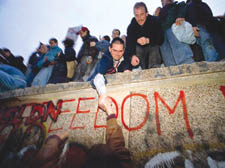|
|
 |
| |

November 1989: the collapse of the Berlin Wall saw the end of the Cold War |
Camden books | Review | Collapse of the Soviet Union | Fall of the Berlin Wall | Democracy | Cold War
If you care about what’s happening in the world right now, read this book, writes Cathal Sheerin
IN 1992, Francis Fukuyama declared the end of history. He argued that the collapse of the Soviet Union and the end of the Cold War had signalled the ultimate triumph of liberal democracy, and that we had now arrived at the perfect system for governing man. For many, this heralded a new era of hope, where nations would choose economic integration and co-operation instead of ideological and geopolitical conflict.
But, according to Robert Kagan – foreign policy adviser to US presidential hopeful, senator John McCain – we were wrong to be so optimistic. In his new book, The Return of History and the End of Dreams, Kagan argues that what then seemed like a new dawn was in fact a mirage, and that we were deluding ourselves that conflict and competition between states would go away. Rather, he says, what happened was that the bipolar conflict between the US-led west and the Soviet Union was replaced by the potential for conflicts between a broader range of “great powers,” including democracies like America, Japan, India and the EU, and autocracies, like Russia and China. According to Kagan, we are now in an age of “divergence,” and history has returned in a renewal of inter-nation conflict.
For Kagan, this is merely the natural order of things: states will always seek greater power, wealth and status, and this will eventually lead to conflict – sometimes armed conflict – where one state’s ambitions collide with another’s. With the rise of nationalism among the great powers, the recent large increases in military spending in many of these states, and the inevitable scramble for natural resources, these collisions are already on the increase.
Indeed, Kagan foresees a broad struggle between what he calls “the forces of democracy” and “the forces of autocracy,” and argues that the nations of the world are already dividing and allying themselves along democratic vs autocratic lines.
So, what is to be done? Pointing to the many failings of the UN Security Council – often paralysed by vetoes from autocratic powers – Kagan suggests that democratic nations should form a “concert of democracies,” a loose body of states which would co-operate on international crises, promote liberal ideals such as human rights, and share decisions that would be to the benefit of all democratic nations.
Kagan’s argument is seductive in its simplicity, and this is why it plays so well in the US. This is politics played on the big stage, with competition between states driven by old-fashioned, selfish desires for international aggrandisement: it is a worldview easily communicated to the US electorate.
However, such a simple approach does leave a few issues unexplored. The most notable of these is how Kagan’s exclusive “concert of democracies” might further ratchet up tensions with autocratic Russia, just as Nato expansion has already done. Nor does Kagan consider the place of the smaller nations in what would effectively be a return to a bipolar world: what would be the plight of those vulnerable states on the buffer zones where the democratic and autocratic worlds would meet?
Whether you agree with Kagan’s politics or not, if you care about what is happening in the world right now, read this book. Kagan has influence at the highest levels in America, both with Republicans and Democrats. He is one of those who set the agenda for public debate on international relations, and his book will leave you feeling that the world is an even more dangerous place than you’d thought.
|
 |
|
 |
 |
|
 |
|



